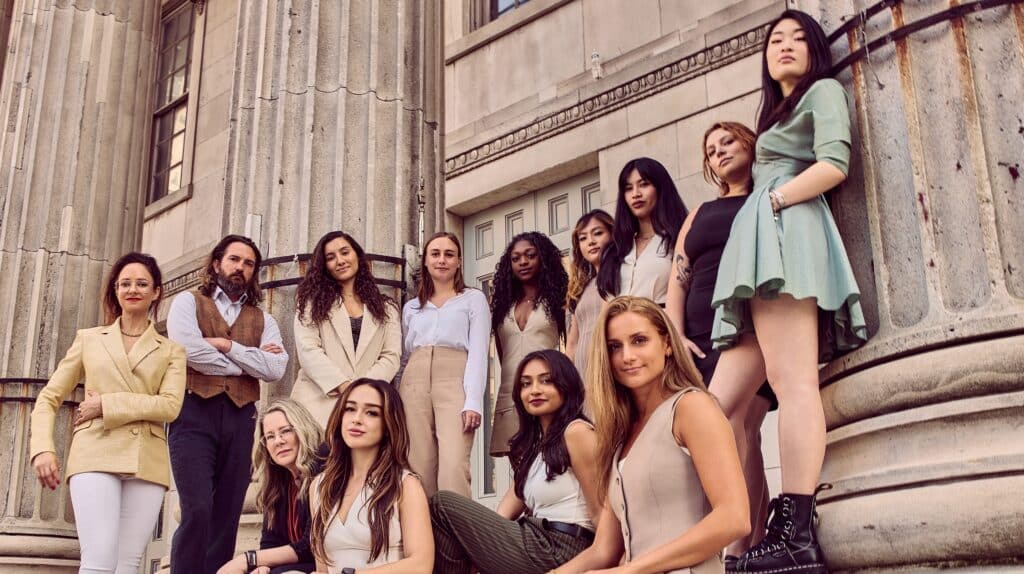Warning: the following contains potentially disturbing content relating to suicide. Please take care – at any point you can scroll straight to the bottom for resources including the National Suicide Prevention Lifeline at 1-800-273- 8255.
You might have heard about the tragic passing of Daisy Coleman last week.
At just 23 she was the fierce co-founder of SafeBAE, a teen-led organization helping to prevent sexual assault in middle and high schools. Back in 2015, when a particularly horrendous case came to Carrie that left her stumped and devastated, she turned to SafeBae and Daisy’s twitter feed for inspiration. The loss of Daisy’s young life has sent ripples through the victims’ rights community for a number of reasons; one being that it was heart-breakingly predictable.
Those who experience sexual assault are 10x more likely to attempt suicide, according to a study by the National Victim Center, and for women, the odds of attempting suicide is 3 to 4 times greater when the first reported sexual assault occurs before age 16.
We see the long-term effects of sexual violence every day in our work – ranging from depression, to substance abuse, bulimia to agoraphobia, flashbacks, insomnia, chronic illness, inability to hold down a job or form a relationship.
“It’s kind of a perfect storm. If you’re trying to design a traumatic experience that would really stick with a person, it’s hard to think of a worse one than sexual violence,” Seth J. Gillihan, who runs a clinical practice and researched PTSD, told USAToday “It’s the most potent traumatic event in terms of leading to PTSD and long-term disruptions,” Gillihan said. “It has all the ingredients – it’s interpersonal, rather than impersonal (like being in a car accident or fire or natural disaster), and the intimacy means it breaks trust in a major way.”
However it’s not just the ‘event’ that is traumatic – but everything that comes after. In Daisy’s case, that was bullying, trolling, harassment, and disbelief. Surviving assault is a battle for sure, but for many survivors the trauma is impacted and exponentially multiplied by other’s reactions to it.
Soraya Chemaly’s Twitter post articulated what so many of us felt:
“I can’t shake Daisy Coleman’s death today. There needs to be a different word than “suicide” to describe what happened to her and so many other survivors of assaults.”
“I consider it “passive murder,” responded Melissa Schuman. “Every single person who harassed Daisy and her family is now guilty of contributing to her death. Verbal lashing and harassment of victims of rape should be considered a hate crime & there should be legal recourse for it.”
But how could there be legal recourse for something we cannot even bear to say out loud? – That victims of sexual violence are treated worse than crap, and that the horrors they face are not just founded in the abuse itself, but in the reactions of everyone else – which range from willful ignorance to outright violence.
“This happened in front of all our faces,” said Carrie. “And I’m not talking only about the rape, the left-for-dead, the video, the cover-up, the fire, the trolling, the addiction. She was here on Twitter asking for help, needing money, saying how hard it was. It takes a village to kill someone.”
It’s something we are always conscious of and discuss with our clients – the potential for the process of a legal action to retraumatize a victim further. Our number one priority is their wellbeing and that means being brutally honest, when needed, about the harsh reality of the judicial system and how victims may be treated. We want you to make an informed decision about what is best for your future. We think it’s one of the reasons why having an attorney who gets it – like really gets it – is so important.
To those victims who go ahead and fight their abuser in court, society – all of us – owes an enormous debt.
Daisy was 14 when she was raped at a gathering in her small hometown of Maryville, Missouri.
Her mom Melinda had found her slumped unconscious in her front yard the next morning, “The first thing I noticed was she had frostbite on her hands and feet,” explained Melinda.
“It was 21 degrees that night and she was in a T-shirt and sweatpants. Her hair was wet, we’ve never found out the whole story but we think she must have thrown up and they washed it and it was frozen to the ground. They had just thrown all her belongings, her purse and things, her underwear and bra, in the yard next door. Her brothers found them. Tristan [her brother] said she was blue and sparkly. He thought she was frozen. He thought she was dead.”
After speaking out about the attack and naming Matthew Barnett – the grandson of former Missouri state representative Rex Barnett, an influential Republican – as a perpetrator, Daisy and her family were harassed and trolled mercilessly: online, at school, and in the media.
When her accusations emerged, social media exploded with vile comments and hashtags that branded Daisy a liar, whore, skank.
In a piece Daisy wrote for Seventeen magazine in 2013, she explained that people “said horrible things, like how I should slit my wrists and kill myself. It was so intense that I started having anxiety issues and panic attacks—I would start shaking uncontrollably and had trouble breathing. The hashtag #daisyisaliar showed up everywhere.”
In the school halls, people yelled cuss words at her and called her a liar. “People I don’t even know—college girls related to the boys at Matt’s house that night, even some adults who had just heard the story through people in our town—were calling me a bitch, a whore, and a slut every single day.”
One Fox News guest suggested Coleman had ‘expected’ to get raped, and her mom claimed she was fired from her job over the ‘scandal’. Daisy and her family eventually moved out of Maryville after threats and harassment; their house was mysteriously torching to the ground in an enormous fire right after.
“I’ve never been the sensitive type,” Daisy told Seventeen “but when you hear awful things about yourself everywhere you go, you can start to believe them.”
Before that January night Daisy loved cheerleading, performing on the dance team, and wrestling. After the rape, she barely had the energy to get out of bed, let alone go to school and practice.
Meanwhile Matthew Barnett plead guilty to endangering a child, acknowledging that he supplied 14 year old Daisy with vodka then dumped her in sub-freezing temperatures, and received two years probation and was asked to pay restitution of $1,800 towards Daisy’s counselling.
“They called themselves the Wolf Pack”
Daisy’s mom Melinda alleges that “Before the charges against Barnett were dismissed, about 12 or 13 girls came forward to make statements that something similar had happened to them, but one by one they fell away when they saw what was happening to Daisy. They were intimidated and I can’t blame them. It was always the same boys, or a variation of that group. They called themselves the Wolf Pack.”
When the charges of rape were dropped, friends of Barnett celebrated across social media with the hashtag #jordanandmattarefree. Girls at the dance studio Daisy attended had T-shirts made saying ‘Matt 1: Daisy 0.’ And Sheriff Darren White told the Kansas City Star that the Maryville system did its job and the Coleman family needs to “get over it.”
“Get over it”
Daisy (by that time 16) said in a statement released by her attorney, “To all those who supported me, I promise that what happened on January 8, 2012, will not define me forever.” And she didn’t – she achieved amazing things. She went on to co-found SafeBAE, the teen-led organization helping to preventing sexual assault in middle and high schools, and she bravely told her story in Netflix’s Audrie & Daisy, which also featured the story of Audrie Pott, who said was sexually assaulted by a group of men when she was 15 and took her life eight days later.
Sheriff White featured in the documentary – proudly maintaining his belief that Daisy and another victim were somehow as culpable as the offenders, and telling viewer that teenage girls lie for attention.
“The boys are the only ones that want to put this behind them, get on with their lives and make something of themselves,” he enthuses about the perpetrators. “The boys are going to work, college, trying to do better.”
“How many times do we have to hear this story? It’s one stereotype and rape myth after another,” said Soraya Chemaly back in a 2013 article about the case.
“None of this is new. Time and again we hear about innocent boys’ lives being ruined by lying girls. This goes beyond simple double standards and into the reality of the enduring, everyday harm of deep-seated patriarchal norms that insist on teaching children that women are devious, untrustworthy liars incapable of moral agency, unfit for respect outside of a narrowly defined band of what constitutes a subservient “good.”
Daisy fought that BS over the course of nearly a decade, she fought so, so hard. But as her mother shared last week in a Facebook post, “She never recovered from what those boys did to her and it’s just not fair. My baby girl is gone.”
In reality, Daisy was perhaps never allowed to recover. She was harmed and traumatized – not just once by an attacker she thought was a friend, but constantly for nearly a decade by trolls, bullies, victim-blamers, law enforcement officers, the media, the entire judicial system.
Daisy told Seventeen “I’ll keep telling my story wherever I can, because it might keep history from repeating itself […] so many girls have come to me and said that they were raped but they were too scared to tell anyone. They go home at the end of the day and feel like no one will believe them or no one will care. I want other girls to understand that there will always be people who won’t believe you, but all it takes is one person to listen, and you’ll be able to feel heard.”
To all you survivors – you warriors who fight for your life every fucking day: We see you. We hear you. We are so proud of you. And we are fighting right alongside you.
If you need help please call the National Suicide Prevention Lifeline at 1-800-273-TALK(8255) or visit their website. They have an online chat option, or you can text the Crisis Text Line – start by texting TALK to 741741.
If you are struggling due to sexual assault, you can call the National Sexual Assault Hotline on 800.656.HOPE (4673) or talk via secure online chat at online.rainn.org.
International suicide/crisis resources can be found here.
Our specialized team has never been more devoted to helping you. We are fully staffed (working remotely) contact us here or call 646-666-8908 to schedule a case evaluation.
Let’s stay connected!
[vc_row][vc_column][/vc_column][/vc_row]




